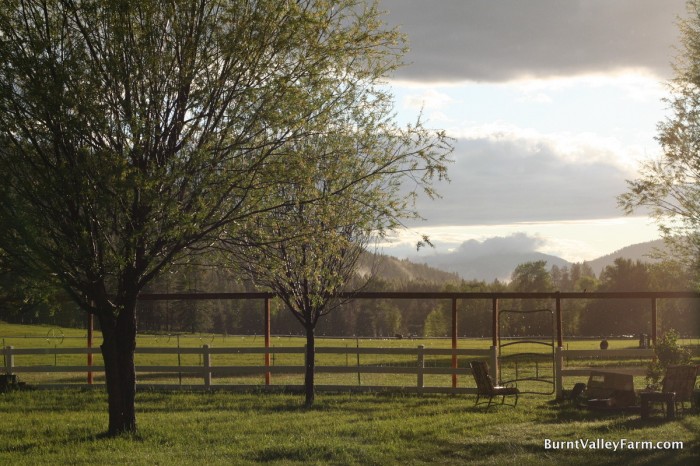
Ten minutes east of Chewelah, Burnt Valley Farm is 22 lovely acres nestled between Eagle Mountain and South Fork Chewelah Creek. After moving to the area in 2008, we were happy to have room for our daughters’ horses and to raise beef, pork, chicken and eggs for our own table. Then came the fateful day Joan spotted “Salad Bar Beef” by Joel Salatin at the Chewelah Library. We were inspired!
As Christians, our desire is to treat our animals and the land itself as gifts from God. We’ve learned that with proper sustainable farming practices, we could raise animals that would produce top quality meats for health and flavor. When cattle and chickens “work together” on the pasture not only do the animals benefit, the pasture is revitalized. We are able to avoid the use of heavy chemical fertilizers and herbicides. The chickens do a great job of distributing bovine fertilizer, just by spreading around the cow pies when they’re looking for fly larvae and other tasty treats. And of course, the chickens lay down their own brand of nitrogen rich fertilizer as they go about their business. We see the effects in the vibrant green grass that the cows love. A healthy pasture feeds healthy animals that produce healthy meats and eggs for healthy humans!
Currently, there are over 300 laying hens cruising the pastures in “Egg Mobiles” 1 and 2. They range free during the day and are safely tucked in their mobile coop at night. They always have access to clean laying boxes, fresh water, feed, grit, and a safe place to roost. Becca manages all aspects of egg production: feeding and watering chickens, moving the Egg Mobiles, keeping things clean, collecting, washing and packaging eggs. When you buy Burnt Valley Farm eggs, you’re supporting Becca’s entrepreneurial efforts.
The last batch of 2016 is in the freezers and also available at Front Porch Farm in Addy, Meyers Falls Market in Kettle Falls, and our booth at Chewelah Farmers Market. Robbie is manager of the meat chicken department. He gets the chicks started in brooders, feeding, watering, and carefully watching the temperature of the brooder. When the young chickens are ready for the pasture, he continues to feed and water and also moves the ‘chicken tractors’ 2-3 times a day to fresh grass.
On processing day, we rent the CADC mobile processing unit and work as a family taking the chickens from pasture to freezer. Some customers come out in the afternoon to pick up chicken before it’s frozen. The kids are paid “per bird” and Robbie reaps the reward of his weeks of work as well. It’s a day of hard work, but great memories. We start early and take a mid-morning break for a big breakfast. And, hopefully, a few hours at Quarry Brown’s Lake at the end of the day.
Summer is a great time of year for the cattle. The pastures are coming in strong and the cows are looking sleek and fat.
We raise pigs in small batches, bringing a few to the butcher every few months.
When it comes to feed, the cattle eat only grass (including local hay during the winter). Chickens and pigs eat a custom feed that contains NO corn, soy, GMO’s, medications or hormones. With this diet, meats are lean, dense and have wonderful flavor.
Burnt Valley Farm is a work in progress. Tractors and lawnmowers break down. Chickens and cows get into (or out of) places they shouldn’t. There is always more work to be done than time or hands to do it. But the land is improving, the animals are healthy, the air is clean and the growing young Thompsons are thriving. We’re producing meats and eggs that are the healthiest and tastiest we know how to do. Country life is sweet and we are thankful.